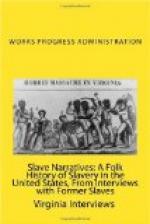My husband took one or two of the older men with lanterns and made an investigation. When they reached the branch the overflow was gone and there was no evidence that there had been any water over these fields except for the large blocks of ice that was lying in the field.
With much persuading and cajoling the majority of these negroes went to their cabins that night and the most skeptical stayed in my kitchen all the rest of the night. But peace and quiet reigned once more and from that day as long as these tenants remained with me I did not have any trouble with them being superstitious but each time the tenants were changed the same superstitions had to be met with and their fears had to be quieted.
Negro Folk Songs: (Contributed by William Warfield, Col.)
These songs more commonly called plantation melodies, originated with the negroes of the South during the days of slavery. They habe been somewhat collected and written about.
These songs have for the Negro the same value that the folk songs of any people have for that people. In the days of slavery they furnished an outlet for aching hearts and anguished souls. Today they help to foster race pride and to remind the race of the “rock from which it was hewn”. Some of these folk songs represented the lighter side of the slave’s life, as for example,
“Heave away! Heave away!
I’d rudder co’t a yallar gal
Dan work foh Henry Clay
Heave away, yaller gal, I want to go.”
or:
“Ole Massa take dat new brown coat,
And hang it on de wall;
Dat darkey take dat same old coat,
And wear it to de ball,
Oh, don’t you hear my tru lub sing?”
It was in their religious song, however that they poured out their souls. Three things are especially emphasized in these song. First this life is full of sorrow or trouble:
“Nobody knows da truble I sees,
Nobody but Jesus.”
Second, religion is the best thing in the world. It enables you, though a slave, to have joy of the soul, to endure the trials. Future life is happy and eternal:
“We’ll walk dem golden streets,
We’ll walk dem golden streets,
We’ll walk dem golden streets,
Wear pleasure nebber dies.”
or:
“Oh! I’se a-gwine to
lib always,
Oh! I’se a-gwine to lib always,
Oh! I’se a-gwine to lib always,
Wen I git in de kingdom.”
Annie Morgan:
Story of Annie Morgan: (age 65, 207 W. 2nd St., Hopkinsville, Ky.) Annie was born of slave parents. Her mother and father were slaves of the Payne family.
Ques: Annie can you give me or rather tell me of some of your earlier life with your parents, or what your mother and father has told you of things before and after the Civil War.




